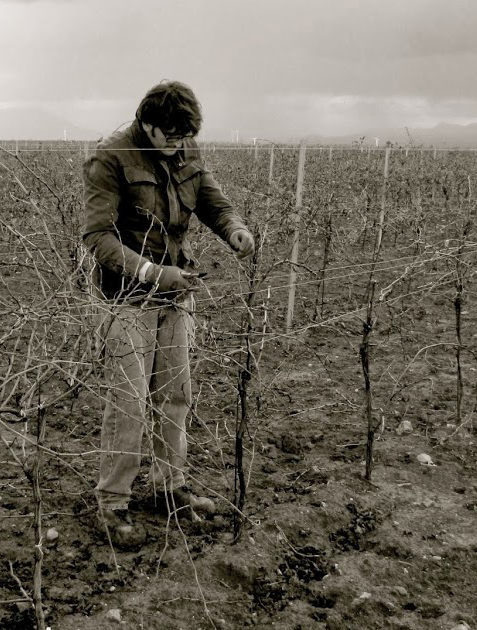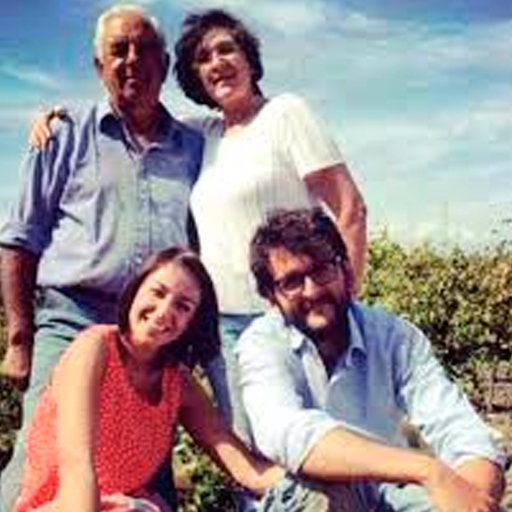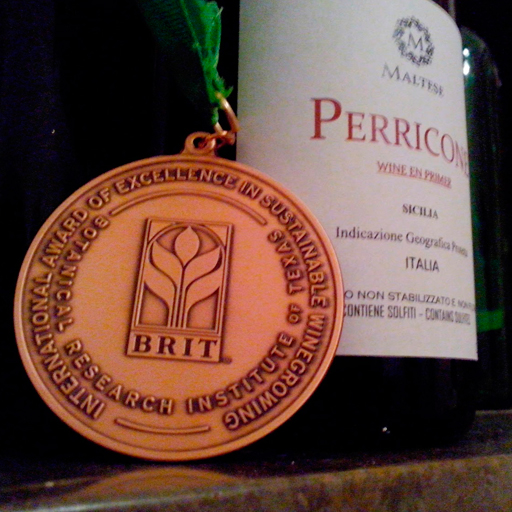The story of the Maltese family began in Sicily five generations ago in the 19th century.
The Maltese family was nicknamed “I cardeddra”, which refers in dialect to a persistent weed, nickname was attributed to a progenitor of the Maltese family, a widow of three husbands, all of whom died in the various wars, and left with 13 children and a company to run. After her death, four generations took care of the Maltese lands, up to Gianfranco who made a job of his passion for wine, becoming an oenologist and recovering some ancient grape varieties.
All the family (Nino, his father in the vineyard, Maria, his mother in the kitchen, and Linda, his sister, in charge of management, communication and marketing) collaborates with Gianfranco. The knowledge and use of social media and of crowdfunding techniques and marketing tools have made Gianfranco a point of reference for other agricultural producers in the area as well.
![]() Name: Gianfranco Maltese.
Name: Gianfranco Maltese.
![]() Birth year: 1984.
Birth year: 1984.
![]() Gender: Male.
Gender: Male.
![]() Education: High School (with Wine Maker Diploma).
Education: High School (with Wine Maker Diploma).
![]() Occupation: Farmer and International Wine Judge.
Occupation: Farmer and International Wine Judge.
![]() Farm location: Marsala, Contrada Tabaccaro.
Farm location: Marsala, Contrada Tabaccaro.
![]() Farm Area in ha: 13.90 ha + 1.10 ha (mother’s property).
Farm Area in ha: 13.90 ha + 1.10 ha (mother’s property).
![]() Farm description: The Maltese family started the farm around the year 1800 in the Western side of Sicily, in a hilly area in sight of the sea. In 2004, Gianfranco took over the company and started replanting native vineyards (Perricone, Damaschino, Nave, Catanese Bianca). His approach was based on a revisited vision of family farming, with a focus on certified organic agriculture, biodiversity, closure of the supply chain from the grapes to the bottles, farm growth driven by export, integration of the main product with cultivations of vegetables (from ancient recipes in pots), olives (Extra-Virgin Olive Oil from the Biancolilla variety) and old grains (Durum Wheat, Russello and Timilia, and Wheat, Maiorca and Maiorcone). The products are offered at the farm as well as online through e-commerce websites such as e-Bay and Amazon) and through direct selling (B2C – Japan and some European countries and B2B – Austria and the Netherlands). This experience is shared with other young farmers and this collaboration has contributed to open in 2019 two shops, one in Belgium, Brussels, and another one in the Netherlands, unfortunately currently closed because of the Covid-19 crisis.
Farm description: The Maltese family started the farm around the year 1800 in the Western side of Sicily, in a hilly area in sight of the sea. In 2004, Gianfranco took over the company and started replanting native vineyards (Perricone, Damaschino, Nave, Catanese Bianca). His approach was based on a revisited vision of family farming, with a focus on certified organic agriculture, biodiversity, closure of the supply chain from the grapes to the bottles, farm growth driven by export, integration of the main product with cultivations of vegetables (from ancient recipes in pots), olives (Extra-Virgin Olive Oil from the Biancolilla variety) and old grains (Durum Wheat, Russello and Timilia, and Wheat, Maiorca and Maiorcone). The products are offered at the farm as well as online through e-commerce websites such as e-Bay and Amazon) and through direct selling (B2C – Japan and some European countries and B2B – Austria and the Netherlands). This experience is shared with other young farmers and this collaboration has contributed to open in 2019 two shops, one in Belgium, Brussels, and another one in the Netherlands, unfortunately currently closed because of the Covid-19 crisis.
Web site http://tenutamaltese.blogspot.com/
Most of the funds were coming from the wine sector promotion funded in 2013-2014 by the Ministry of Agriculture, Food and Environmental Policies (MiPAAF) 2013-2014, focused on sustainability and circular economy, and from the Common Organization Plans (2016-2017 promotion tour in Japan). The rest was self- and crowdfunded.
The idea of starting a crowdfunding campaign came from the experience done during the Expo 2015 in Milan under the initiative “Vivaio delle idee” (Nursery of Ideas), aiming at bringing people closer to the land. Gianfranco had the idea to create a connection between himself and his customers by starting the crowdfunding campaign “Adopt a vine”. In this way, people were attracted to sponsor a vine, or more vines in a parcel, and follow-up on the sponsored vine by being informed on the vine growth up to the harvest of grapes, wine production and aging and wine bottle shipment. At the same time the proposal was an invitation to visit the farm (come to visit your vineyard), hosted in the holiday home, and tasting wines together with farm products self-cooked from ancient recipes. After his first experience of crow-funding, Gianfranco got in contact with a group of e-commerce and fund-raising experts from the platform Biorfarm (www.biorfarm.com), collecting farmers from all over Italy, telling their stories and selling their products by means of the crowd-funding action “Adopt or donate a tree”. In this case the final products connected to the vine are raisins from different species of vines. The vine is shown on a picture with the name of the subscriber who can follow the product shipment and delivery.
“A challenging objective is to make a product unique, to win on the market. This starts from the land, the ecosystem, the choice of biodiversity and the production process, but it must be communicated and promoted to become well-known. Therefore, the knowledge and use of the existing web technologies as well as funding techniques for financing your business are fundamental. It is also key to have a strategic advisor to help to design a solid business strategy. His advice to all farmers can be summarized as follows: (1) start from tradition and biodiversity and find out an innovative quality product; (2) stay tuned with the world and well connected to your customers and supporters; (3) realize your ideas and vision through innovative financing such as a crowd-fund with a focus on personalized forms of private equity.”
![]() Training experiences and gaps: Gianfranco started firstly from his passion for my land and had a special interest in winemaking, management and business economics, agricultural techniques and mechanics, knowledge on agricultural equipment and supply chains and quality management.
Training experiences and gaps: Gianfranco started firstly from his passion for my land and had a special interest in winemaking, management and business economics, agricultural techniques and mechanics, knowledge on agricultural equipment and supply chains and quality management.
All those competences are fundamental to manage a farm in his view.
He would like to deepen his knowledge on i) English language, ii) Wine Master, and iii) Communication Strategy.
The wine sector is characterized by a global dimension as it is more and more representing a symbol of geographical and cultural values.
There are farmers’ movements in many countries contributing to rediscover old varieties well distinguished from others and giving a plus to the quality of products.
In this view, wine can be considered an excellence of the local food production in close connection with the traditionally heritage products.
Think global and act local is a trend for a more economically and environmentally sustainable agriculture and a valuable objective for all young farmers.
![]() Final considerations: Gianfranco is a self-made entrepreneur but with masters from my family, like his grandfather and enologists providing him with advice and counselling. This kind of advice was also fundamental to open Gianfranco to the world and become an international wine judge. From that observatory he can understand the evolution of the wine world.
Final considerations: Gianfranco is a self-made entrepreneur but with masters from my family, like his grandfather and enologists providing him with advice and counselling. This kind of advice was also fundamental to open Gianfranco to the world and become an international wine judge. From that observatory he can understand the evolution of the wine world.
His main training courses and practical experiences were based on farm management, marketing and agricultural and food techniques in the viticulture and wine sector.
He received advice about management counselling from the Chamber of Commerce and ICE (Italian Institute for Foreign Trade); on marketing from IC and technical counselling from winemakers.
One of his most important advice is to choose a strategic advisor to create your strategy.
According to Gianfranco, a strategic contribution from European policies to the local rural development, could be to fund farm projects through call for proposals not conditioned to specific categories of investments but just on general criteria such as sustainability, footprint reduction and circular economy measures.
Informal learning, through farmers’ networks sharing their experiences, knowledge and competences is not less important than formal training. Gianfranco is actively involved in some networks, such as Biorfarm, for digital business, “I nuovi mille” start-up based on sustainable rural development, and Community Based Purchase Groups (GAS), Le galline felici (The happy chickens) and L’alveare che dice si (The hive that says yes).







